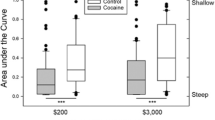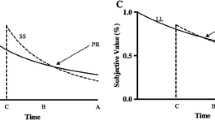Abstract
Rationale
Recent studies on reinforcer valuation in social situations have informed research on mental illness. Social temporal discounting may be a way to examine effects of social context on the devaluation of delayed reinforcers. In prior research with non-drug-using groups, we demonstrated that individuals discount delayed rewards less rapidly (i.e., value the future more) for a group of which they are a member than they do for themselves alone.
Objectives
The current study examined how cigarette smoking and level of alcohol use relate to rates of delay and social temporal discounting.
Methods
In this study, we used crowd-sourcing technology to contact a large number of individuals (N = 796). Some of these individuals were hazardous-to-harmful drinkers (n = 269), whereas others were non-problem drinkers (n = 523); some were smokers (n = 182), whereas others were nonsmokers (n = 614). Delay discounting questionnaires for individual rewards (me now, me later) and for group rewards (we now, we later; me now, we later) were used to measure individuals’ discounting rates across various social contexts.
Results
Our analyses found that smokers discounted delayed rewards more rapidly than controls under all conditions. However, hazardous-to-harmful drinkers discounted delayed rewards significantly more rapidly than the non-problem drinkers under the individual condition, but not under the social conditions.
Conclusions
This finding suggests that the use of different abused drugs may be associated with excessive discounting in the individual condition and has selective effects when discounting for a group in the social conditions.


Similar content being viewed by others
References
Babor TF, Higgins-Biddle JC, Saunders JB, Monteiro MG (2001) The Alcohol Use Disorders Identification Test: guidelines for use in primary care. World Health Organization, Geneva
Baker F, Johnson MW, Bickel WK (2003) Delay discounting in current and never-before cigarette smokers: similarities and differences across commodity, sign, and magnitude. J Abnorm Psychol 112:382–392
Bickel WK, Marsch LA (2001) Toward a behavioral economic understanding of drug dependence: delay discounting processes. Addiction 96:73–86
Bickel WK, Odum AL, Madden GJ (1999) Impulsivity and cigarette smoking: delay discounting in current, never, and ex-smokers. Psychopharmacology (Berl) 146:447–454
Bickel WK, Yi R, Kowal BP, Gatchalian KM (2008) Cigarette smokers discount past and future rewards symmetrically and more than controls: is discounting a measure of impulsivity? Drug Alcohol Depend 96:256–262
Bickel WK, Pitcock JA, Yi R, Angtuaco EJC (2009) Congruence of BOLD response across intertemporal choice conditions: fictive and real money gains and losses. J Neurosci 29:8839–8846
Bickel WK, Jones BA, Landes RD, Christensen DR, Jackson L, Mancino M (2010) Hypothetical intertemporal choice and real economic behavior: delay discounting predicts voucher redemptions during contingency-management procedures. Exp Clin Psychopharmacol 18:546–552
Bickel WK, Jarmolowicz DP, Mueller ET, Gatchalian KM (2011a) The behavioral economics and neuroeconomics of reinforcer pathologies: implications for etiology and treatment of addiction. Curr Psychiatry Rep 13:406–415
Bickel WK, Landes RD, Christensen DR, Jackson L, Jones BA, Kurth-Nelson Z, Redish AD (2011b) Single- and cross-commodity discounting among cocaine addicts: the commodity and its temporal location determine discounting rate. Psychopharmacology (Berl) 217:177–187
Bickel WK, Yi R, Landes RD, Hill PF, Baxter C (2011c) Remember the future: working memory training decreases delay discounting among stimulant addicts. Biol Psychiatry 69:260–265
Bickel WK, Jarmolowicz DP, MacKillop J, Epstein LH, Carr K, Mueller ET, Waltz TJ (2012a) The behavioral economics of reinforcement pathologies: novel approaches to addictive disorders. In: Shaffer HJ (ed) APA addiction syndrome handbook. APA, Washington, DC, p 1968 (APA Handbooks in Psychology and APA Reference Books)
Bickel WK, Jarmolowicz DP, Mueller ET, Koffarnus MN, Gatchalian KM (2012b) Excessive discounting of delayed reinforcers as a trans-disease process contributing to addiction and other disease-related vulnerabilities: emerging evidence. Pharmacol Ther 134:287–297
Bjork JM, Hommer DW, Grant SJ, Danube C (2004) Impulsivity in abstinent alcohol-dependent patients: relation to control subjects and type 1-/type 2 like traits. Alcohol 34:133–150
Buhrmester M, Kwang T, Gosling SD (2011) Amazon's Mechanical Turk: a new source of inexpensive, yet high-quality, data? Perspect Psychol Sci 6:3–5
Businelle MS, McVay MA, Kendzor D, Copeland A (2010) A comparison of delay discounting among smokers, substance abusers, and non-dependent controls. Drug Alcohol Depend 112:247–250
Charlton SR, Yi R, Porter C, Carter AE, Bickel WK, Rachlin H (2012) Now for me, later for us? Effects of group context on temporal discounting. J Behav Decis Making. doi:10.1002/bdm.766
Courtney KE, Arellano R, Barkley-Levenson E, Galvan A, Poldrack RA, Mackillop J, David Jentsch J, Ray LA (2011) The relationship between measures of impulsivity and alcohol misuse: an integrative structural equation modeling approach. Alcohol Clin Exp Res. doi:10.1111/j.1530-0277.2011.01635.x
Dom G, D’haene P, Hulstijn W, Sabbe B (2006) Impulsivity in abstinent early- and late-onset alcoholics: differences in self-report measures and a discounting task. Addiction 101:50–59
Du W, Green L, Myerson J (2002) Cross-cultural comparisons of discounting delayed and probabilistic rewards. The Psychological Record 52:479–492
Dunn JR, Schweitzer ME (2005) Feeling and believing: the influence of emotion on trust. J Pers Soc Psychol 88:736–748
Gallus S, Rosato V, Zuccaro P, Pacifici R, Colombo P, Manzari M, La Vecchia C (2011) Attitudes towards the extension of smoking restrictions to selected outdoor areas in Italy. Tob Control. doi:10.1136/tc.2010.040774
Green L, Fry AF, Myerson J (1994) Discounting of delayed rewards: a life-span comparison. Psychol Sci 5:33–36
Green L, Myerson J, Lichtman D, Rosen S, Fry AF (1996) Temporal discounting in choice between delayed rewards: the role of age and income. Psychol Aging 11:79–84
Gurtman MB (1992) Trust, distrust, and interpersonal problems: a circumplex analysis. J Pers Soc Psychol 62:989–1002
Jaroni JL, Wright SM, Lerman C, Epstein LH (2004) Relationship between education and delay discounting in smokers. Addict Behav 29:1171–1175
Johnson MW, Bickel WK (2002) Within-subject comparison of real and hypothetical money rewards in delay discounting. J Exp Anal Behav 77:129–146
Johnson MW, Bruner NR (2011) The Sexual Discounting Task: HIV risk behavior and the discounting of delayed sexual rewards in cocaine dependence. Drug Alcohol Depend
Johnson MW, Bickel WK, Baker F (2007) Moderate drug use and delay discounting: a comparison of heavy, light, and never smokers. Exp Clin Psychopharmacol 15:187–194
Jones B, Rachlin H (2006) Social discounting. Psychol Sci 17:283–286
Kirby KN, Marakovic NN (1996) Delay-discounting probabilistic rewards: rates decrease as amounts increase. Psychon Bull Rev 33:100–104
Kirby KN, Petry NM, Bickel WK (1999) Heroin addicts have higher discount rates for delayed rewards than non-drug using controls. J Exp Psychol Gen 128:78–87
Kishida KT, Montague PR (2012) Imaging models of valuation during social interaction in humans. Biol Psychiatry. doi:10.1016/j.biopsych.2012.02.037
Kishida KT, King-Casas B, Montague PR (2010) Neuroeconomic approaches to mental disorders. Neuron 67:543–554
Koffarnus MN, Jarmolowicz DP, Mueller ET, Bickel WK (2012) Changing discounting in light of the competing neurobehavioral decision systems theory. J Exp Anal Behav (in press)
Lawyer SR, Williams SA, Prihodova T, Rollins JD, Lester AC (2010) Probability and delay discounting of hypothetical sexual outcomes. Behav Processes 84:687–692
Lin EY, Witten K, Casswell S, You RQ (2011) Neighbourhood matters: perceptions of neighbourhood cohesiveness and associations with alcohol, cannabis and tobacco use. Drug Alcohol Rev. doi:10.1111/j.1465-3362.2011.00385.x
Madden GJ, Begotka AM, Raiff BR, Kastern LL (2003) Delay discounting of real and hypothetical rewards. Exp Clin Psychopharmacol 11:139–145
Madden GJ, Raiff BR, Laforio CH, Begotka AM, Mueller AM, Hehli DJ, Wegener AA (2004) Delay disocounting of potentially real and hypothetical rewards: II. Between- and within-subject comparison. Exp Clin Psychopharmacol 12:251–256
Mazur JE (1987) An adjusting procedure for studying delayed reinforcement. In: Commons ML, Mazur JE, Nevin JA, Rachlin H (eds) Quantitative analysis of behavior. Erlbaum, Hillsdale, pp 55–73
Mitchell SH (1999) Measures of impulsivity in cigarette smokers and nonsmokers. Psychopharmacology (Berl) 146:455–464
Mitchell JM, Fields HL, D’Esposito M, Boettiger CA (2005) Impulsive responding in alcoholics. Alcohol Clin Exp Res 29:2158–2169
Odum AL (2011a) Delay discounting: trait variable? Behavioral Processes 87:1–9
Odum AL (2011b) Delay discounting: I’m a k, You’re a k. J Exp Anal Behav 96:427–439
Odum AL, Madden GJ, Bickel WK (2002) Discounting of delayed health gains and losses by current, never- and ex-smokers of cigarettes. Nicotine Tob Res 4:295–303
Odum AL, Baumann AA, Rimington DD (2006) Discounting of delayed hypothetical money and food: effects of amount. Behav Processes 73:278–284
Petry NM (2001) Delay discounting of money and alcohol in actively using alcoholics, currently abstinent alcoholics, and controls. Psychopharmacology (Berl) 154:243–250
Reynolds B (2006) A review of delay-discounting research with humans: relations to drug use and gambling. Behav Pharmacol 17:651–667
Reynolds B, Schiffbauer R (2004) Measuring state changes in human delay discounting: an experiential discounting task. Behav Processes 67:343–356
Reynolds B, Karraker K, Horn K, Richards JB (2003) Delay and probability discounting as related to different stages of adolescent smoking and non-smoking. Behavioral Processes 64:333–344
Reynolds B, Richards JB, Horn K, Karraker K (2004) Delay discounting and probability discounting as related to cigarette smoking status in adults. Behavioral Processes 30:35–42
Reynolds B, Leraas K, Collins C, Melanko S (2009) Delay discounting by the children of smokers and nonsmokers. Drug Alcohol Depend 99:350–353
Rezvanfard M, Ekhtiari H, Mokri A, Djavid GE, Kaviani H (2010) Psychological and behavioral traits in smokers and their relationship with nicotine dependence level. Arch Iran Med 13:395–405
Rotenberg KJ (1994) Loneliness and interpersonal trust. J Soc Clin Psychol 13:152–173
Rotter JB (1967) A new scale for the measurement of interpersonal trust. J Pers 35:651–665
Saunders JB, Aasland OG, Babor TF, de la Fuente JR, Grant M (1993) Development of the Alcohol Use Disorders Identification Test (AUDIT): WHO collaborative project on early detection of persons with harmful alcohol consumption—II. Addiction 88:791–804
Sprouse J (2011) A validation of Amazon Mechanical Turk for the collection of acceptability judgments in linguistic theory. Behav Res Methods 43:155–167
Stea JN, Hodgins DC, Lambert MJ (2011) Relations between delay discounting and low to moderate gambling, cannabis, and alcohol problems among university students. Behavioral Processes 88:202–205
Sweitzer MM, Donny EC, Dierker LC, Flory JD, Manuck SB (2008) Delay discounting and smoking: association with the Fagerström Test for Nicotine Dependence but not cigarettes smoked per day. Nicotine Tob Res 10:1571–1575
Vuchinich RE, Simpson CA (1998) Hyperbolic temporal discounting in social drinkers and problem drinkers. Exp Clin Psychopharmacol 6:292–305
Wackowski OA, Lewis MJ, Hrywna M (2011) Banning smoking in New Jersey casinos—a content analysis of the debate in print media. Subst Use Misuse 46:882–888
Washio Y, Higgins ST, Heil SH, McKerchar TL, Badger GJ, Skelly JM, Dantona RL (2011) Delay discounting is associated with treatment response among cocaine-dependent outpatients. Exp Clin Psychopharmacol 19:243–248
Wood AM, Brown GD, Maltby J (2011) Social norm influences on evaluations of the risks associated with alcohol consumption: applying the rank-based decision by sampling model to health judgments. Alcohol Alcohol. doi:10.1093/alcalc/agr146
Yi R, Gatchalian KM, Bickel WK (2006) Discounting of past outcomes. Exp Clin Psychopharmacol 14:311–317
Acknowledgments
This work was funded by NIDA Grants R01 DA 024080, R01 DA 024080-02S1 (NIAAA), R01 DA 030241 and the Virginia Tech Carilion Research Institute. The authors would like to thank Patsy Marshall for assistance with manuscript preparation.
Conflict of interest
The authors have no conflict of interest.
Author information
Authors and Affiliations
Corresponding author
Rights and permissions
About this article
Cite this article
Bickel, W.K., Jarmolowicz, D.P., Mueller, E.T. et al. Altruism in time: social temporal discounting differentiates smokers from problem drinkers. Psychopharmacology 224, 109–120 (2012). https://doi.org/10.1007/s00213-012-2745-6
Received:
Accepted:
Published:
Issue Date:
DOI: https://doi.org/10.1007/s00213-012-2745-6




